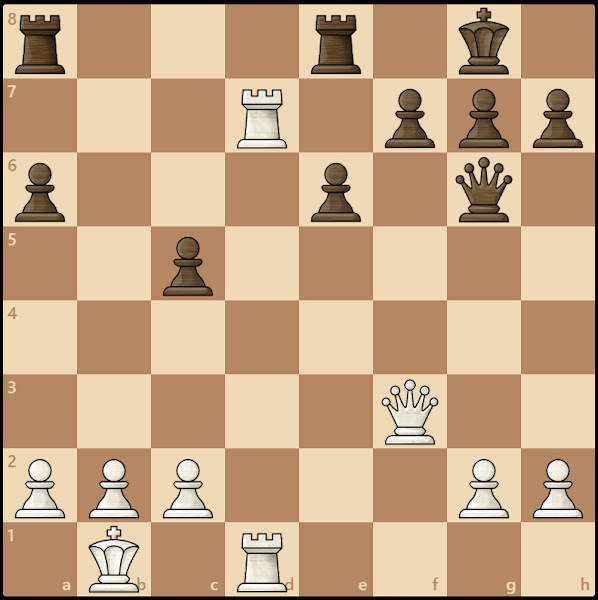< Prev Index Next >
 Let's Play Chess 07 Sep 1957, Sat The Montreal Star (Montreal, Quebec, Canada) Newspapers.com
Let's Play Chess 07 Sep 1957, Sat The Montreal Star (Montreal, Quebec, Canada) Newspapers.com
Let's Play Chess
Champ Capablanca Learned Game Young By William Oaker
The man who eventually dethroned the great Emanuel Lasker, was Jose Raoul Capablanca.
This man, who came to be known as the “chess machine,” learned to play at the ripe old age of four years. He became the champion of Cuba when he was 11.
After winning the championship of his homeland, he did a wise thing: he stopped playing serious chess, and devoted his time to his studies. It was not until he graduated from Harvard University, that he returned to the tournament ring.
When he was still only 21, he played a match with the then champion of the United States, and one of the world's leading grandmasters, Frank James Marshall.
He surprised everyone, and received international recognition, when he defeated the American by a score of eight wins, only one loss, and 15 draws.
Second in List
This surprising victory resulted in his being invited to San Sebastian in 1911. This was a very strong event with most of the best players in the world taking part. He won, and thereafter established himself as the second best player in the world.
From 1911 until late in the thirties, he never finished lower than third in any tournament he entered, and this only happened once, in Moscow, in 1925.
During one stretch, from 1914, to 1924, he did not lose a single game—10 years of perfect chess!
In 1921, he met and defeated Lasker in a match in Havana by the score of four wins, no losses and 10 draws. Lasker, it must be said, had to withdraw after the fourteenth game because of ill-health.
The secret of Capablanca's great strength lay in the fact that he had learned at such an early age. It is much like learning a language. If your learn it while you are young, you are able to talk automatically, without too much thought. If you learn it later in life, it requires thought and study, and even then mistakes are made.
So it is with chess. Capablanca was the most confident chess player that ever lived. He was never in doubt about a position. His evaluation of a given position was intuitive and lightning fast. Occasionally masters would play what is called rapid transit chess, at 10 seconds a move. In this he handled the other leading masters as if they were children.
All this added up to the fact that he could analyse games at tremendous speed and with deadly accuracy.
Capablanca was a big man, well over six feet tall. He was an expert tennis and polo player. When he was not in a tournament he seldom looked at a chess board. So popular was he, his government made him a roving ambassador and sent him all over the world. When he died during World War II, Cuba issued a special commemorative stamp in his honor.
He was probably the most successful chess player that ever lived since the royal game left the courts of Italy and Spain in the 14th century.
Six-Years Title
Surprisingly, he held his title for only six years. In 1927 he was defeated by a fanatical chess genius, who lived an breathed the game, Alexander Alekhine.
He still was one of the best right up until the Russian school began showing its might. Finally, the new players, Botvinnik, Keres, Smyslov, Fine, Reshevsky, and Euwe, began to make themselves felt and the chess machine slowly ground to a halt.
Many years ago a young man came out of the western world and established himself as unbeatable. His name was Paul Morphy.
It was a long time later that a prodigy came along to take his place. This was Capablanca.
Now, a new boy wonder is on the loose. His name is Bobby Fischer, a lad from the streets of Brooklyn. He started the chess world by winning the United States Open Championship this summer in Cleveland. Now he is on his way to Hastings, England to meet the masters of the world. From there he will venture into Russia to try his skill.
The remarkable thing about this lad who has placed himself amongst the best in the world is that he is still only 14 years old. The west is looking for another Morphy or Capablanca. Perhaps Bobby Fischer, with his blue jeans, running shoes, and friendly grin, will be the one.
The Vulnerable First Rank
Your opponent's first rank, his home base, is often vulnerable because the king is hemmed in behind his own protecting pawns. If a rook manages to sneak into this sacred area, it often spells checkmate.
FEN r3r1k1/3R1ppp/p3p1q1/2p5/8/5Q2/PPP3PP/1K1R4 w - - 0 1
1. Qxa8 Rxa8 2. Rd8+ Rxd8 3. Rxd8#
In the above position, for example, this factor leads to a devastating sacrifice on the part of white, which completely destroys the black game.
1. QxR! What is black to do? If he does not take the queen he will be down a whole rook.
1. … RxQ
2. R-Q8 check! Now of course, the fat is in the fire. Black must play.
2. … RxR. And white finished him off with
3. RxR checkmate.
The king is dead. He has been betrayed from within. It's time for another game.























